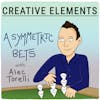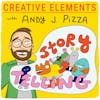
#55: Alec Torelli – Why a professional poker play is betting big on BitClout
Play EpisodeAlec Torelli is a professional high-stakes poker player turned creator, who shares how the lessons he learned from poker can be applied to life and business.
Alec Torelli is a professional high-stakes poker player turned creator, who shares how the lessons he learned from poker can be applied to life and business.
Alec is the founder of Conscious Poker, a popular poker training platform, and after spending the last 14 years making decisions for hundreds of thousands of dollars in a single hand, he now gives talks in which he dissects the anatomy of decision making to help others hone the way they make choices.
Lately, Alec is one of the leading voices in the conversation about BitClout, a decentralized social media platform that looks and feels much like Twitter.
In this episode, we talk about his history as a poker player, how that impacted his relationship to money, how he makes decisions, and why he believes BitClout is an asymmetric bet worth taking.
Disclaimer: What Alec and I talk about in this show is for informational purposes only, and is not financial advice. We do not know your specific financial situation, and so you must do your OWN diligence before making any type of investment decision.
Read Alec Torelli's Ultimate Guide to BitClout
Follow Alec Torelli on BitClout
Full transcript and show notes
***
LISTENER SUPPORT
Join our community on Facebook
Support this show through Buy Me A Coffee.
***
SPONSORS
Try Podia and save 15% for life as a Creative Elements listener
Start your free trial of SavvyCal and get your first month free using promo code ELEMENTS
Get a free month of Blinkist Premium
***
ABOUT JAY CLOUSE
Subscribe to my weekly newsletter
Follow Jay Clouse on Instagram
Enroll in my course on podcasting, Podcast Like The Pros
***
PODGLOMERATE NETWORK
This show is a part of the Podglomerate network, a company that produces, distributes, and monetizes podcasts. We encourage you to visit the website and sign up for our newsletter for more information about our shows, launches, and events. For more information on how The Podglomerate treats data, please see our Privacy Policy.
Since you're listening to Creative Elements, we'd like to suggest you also try other Podglomerate shows surrounding entrepreneurship, business, and careers like Rocketship.fm and Freelance to Founder.
Learn more about your ad choices. Visit megaphone.fm/adchoices
Alec Torelli 0:00
And now for the first time, you can actually bet on your favorite creator. Whereas in the past, if you find someone on Twitter who's doing cool things with 2000 followers, and you think he's gonna have 200,000 in the future, what do you do you follow him and get to tell your friends that you found him first. Now you can invest money in that creator and reap their 100x upside if they go to the moon.
Jay Clouse 0:21
Welcome to Creative Elements, a show where we talk to your favorite creators and learn what it takes to make a living from your art and creativity. I'm your host, Jay Clouse. Let's start the show.
Hello, my friend. Welcome back to another episode of Creative Elements. I'm grateful that you've chosen to spend another hour here with me today. on this show, we often hear about creators who got a little bit lucky and started their careers alongside new platforms. Tim Urban caught the wave of Facebook's advertising model. Vanessa Van Edwards started blogging when SEO was a little bit easier. And anyone starting before 2010 seems to have had a big advantage with social media too. Since identifying those patterns across guests on this show. I've kept my eyes open to new social platforms that I may be able to jump on and ride in early wave. And believe it or not, it seems like we're in a little bit of a magical time for new social platforms. In the last couple of months, I've joined a few new platforms including Clubhouse, Telepath, Racket, and BitClout. I'm guessing you've probably heard of Clubhouse at this point. But some of those others may be a little more new to you. And conceptually, the platform that is the most interesting to me right now is BitClout. Now you may be asking what the heck is BitClout.
Alec Torelli 1:48
A decentralized Twitter where everyone gets their own creator coin that's freely tradable on the open market.
Jay Clouse 1:53
That incredibly concise description came from Alec Torelli, when I was trying to learn more about BitClout his name came up over and over again. In fact, he's one of the leading voices when it comes to BitClout and how to best leverage the platform.
Alec Torelli 2:08
And I wrote an article called The Ultimate Guide to BitClout where I had to, like break all these things down. Because I was getting asked like everyday, like, you know, what is this platform? How does it work, and whatever. And so I find that when I write things, I'm able to be incredibly concise and like very clear, and it's the process of writing that forces you to get clear on your own thoughts and ideas. And so I put together that piece of content, which really helped me better understand the platform because I was forced to explain it and teach it to other people.
Jay Clouse 2:33
Over the last year or so, I've been putting a lot more time and energy into Twitter, due in large part to the success I've seen with podcast guests like David Morel, Dickie bush and others. But it's hard to stand out on a platform with nearly 200 million users already. BitClout looks and feels a lot like Twitter. But it's super early days on its platform. And a lot of people are excited about its decentralized nature. Here's Alec on his YouTube channel to explain what I mean.
Alec Torelli 3:00
In this case, decentralized means that it lives on a blockchain like Bitcoin, for which there is no central owner. BitClout itself lives on the internet, as opposed to in a privately owned server, and therefore it cannot be shut down. Bitcoin is groundbreaking, because for the first time you can invest in yourself, and your favorite influencers with real money through the use of creator coins. Every profile on the platform automatically gets assigned its own unique coin, freely tradable on the open market, the price of the coin is subject to the most basic economic law of supply and demand. As people buy the coin, the price rises as people sell, it goes down.
Jay Clouse 3:45
This is some pretty crazy stuff. And whenever there's money and investment involved, you need to do a lot of research and make your own thoughtful decisions and judgment calls. Which brings me to my little disclaimer for this episode. What Alec and I talk about in this show is for informational purposes only, and is not financial advice. We do not know your specific financial situation. And so you must do your own diligence before making any type of investment decision. But here's why I wanted to talk with Alec on the show today. At its core, this is a platform for creators. And by being so early on. This is an opportunity for creators to build a following alongside the platform itself. Now, as we'll talk about in the interview BitClout itself is not a sure bet that it'll stand the test of time the way that other platforms like Twitter and Facebook have. It may not exist even a year from now. But Alec is taking a clear bet on the platform. And what you don't know yet about Alec is that he spent the majority of his life making bets. Before he was a digital creator. He was a professional poker player.
Alec Torelli 4:48
Yeah, I started playing in 2005 I got invited to a friend's house after the beach one day and Chris Moneymaker what a great last name right. Had just won the biggest tournament in the world and The slogan was anyone could win. So everyone was loving poker and getting into it, and it was becoming cool. And so I went over to a friend's house. And as they say, if any, you know, gambler, the worst thing that happens is you win your first time because then you're hooked. And I won $12 my first time playing and I saw that this was something that I kind of had a knack for. I mean, a lot of it was luck. My first time I didn't know what I was doing. But I felt like I liked this game. I was really drawn to it. I was attracted to it. I liked the different elements of the math, the psychology, the people, and the reads and all of these things that played into the skills involved to be a successful poker player, and I just fell in love with the game right away.
Jay Clouse 5:36
With more than $1.5 million in tournament winnings and millions more, both in live and online cash games, Alec is a highly respected poker player in the industry today. In his 14 year career, Alec has traveled to over 45 countries, and has been featured on ESPN, CBS Sports, Travel Channel, Fox Sports, Poker News, and many more. So in this episode, we talk about his history as a poker player, how that impacted his relationship to money, how he makes decisions, and why he believes BitClout is an asymmetric bet worth taking. I'd love to hear your thoughts on this episode. As you listen, you can find me on Twitter or Instagram @JayClouse, you can find me on BitClout @JayClouse, if at the end of this episode, you want to join the platform. I'd love to connect with you there. And now, let's talk with Alec.
Alec Torelli 6:31
I read a book called Play Poker Like The Pros. And it was the story of Phil Hellmuth is one of the most famous successful poker players in the world. And he had saved up $20,000 by the time he was in college, and he dropped out of college without much money to play poker professionally. And so I kind of use this as like a benchmark, like, Okay, if I can save up this much money by this age, then you know, I'm on pace with the best in the world. So that's a good start. Ironically, when I was in college, I had about $20,000 saved when I was 18. And so I was like, Well, you know, this work for Phil Hellmuth, he's the best. Not that I'll be that necessarily. But, you know, this is the path he went on. So I kind of had like a role model someone to look up to someone that had done it. And it really wasn't until after I dropped out of school that I made my parents aware that like this was you know what I was going to do, even though I think they had an idea at the time, because I was so immersed and so dedicated and so committed, so in love with poker. But yeah, I kept that one close to the best until I could prove it out. You know, I proved that I could do it first.
Jay Clouse 7:23
Saving $20,000 at any point in college would have been absolutely mind blowing to me. So did that come from earnings from playing?
Alec Torelli 7:32
Yeah, it all came from poker, I just was playing with friends at home games, we would play for $5, $10, $20 I started playing online, we started playing for more money. And online. nito is a huge ecosystem where there's a lot of money. And I remember I put in $30 into a tournament when I was in high school, I got first place out of 600 people I won like $2,300 in high school, which was so much money at the time that I started playing online more I started moving up in stakes, I started playing, you know, dollar to dollar cash games, worth of buy in was 200. Slowly, you know, cream from my lab to a buy in a 400. I had a week in high school where I made $3,000, it was a bet with a friend that I you know, I could do it because I basically mapped out how much money I needed to make on a daily basis to achieve that goal. And I just set a benchmark and I played, you know, two, three tables four tables at a time, simultaneously. So you're playing four tables at once, making a lot of decisions per hour. And I was able to achieve that. And so like I had these little benchmarks that were happening, these milestones that I was achieving, and I just kept saving up money and did well in tournaments, did well in cash games. And I played a lot of poker.
Jay Clouse 8:36
What was the frame as a 16 to 18 year old in terms of discipline, and saving and knowing where to bet what because it seems to me like you could have that week that you went to $3,000 and then immediately lose everything and you're back at zero and now might take another two years to get to that $20,000 at save. So how did you think about saving and pacing during that time?
Alec Torelli 8:57
I was not good at it. So I will give you completely transparent I was very poor at it. I would over expose myself to risk like I would risk too much of my bankroll. And I didn't practice what's called proper bankroll management, meaning you're risking a small amount of your money in the games that you're supposed to be playing. I would do what's called shot taking, which means you play games that are bigger than what you can afford to try and run up your bankroll. I was like, easy come easy go right. Like I'd made this money fast. I felt like I was on top of the world. And I didn't really have a system like poker wasn't as mature of a market as there is today. Like now in my Alec's Academy program. I teach bankroll management because I learned the hard way I made. This was later in my career, but I made a million dollars when I was 19. playing poker was one of the biggest winners in the world. But because I had these bad bankroll management practices, and I didn't have systems, I did have things in place. I lost back a lot of that money in the next couple of years, which is something a lot of people don't know a lot of people don't talk about. They only talk about the wins and the successes, but I didn't have the right systems in place. I let my ego get in the way I stopped improving. And I lost back most of the money that I want. And so I really was then that I really started to learn like okay, let me build a system to do this right. Have to start at the ground, you know, start back over. If I do build up again, I don't want to take two years in, or whatever, you know, however long it's gonna take to build back up. I want to do it right this time. So I really developed like, you know, more structured and solid bankroll management practices. But in high school, it was just like, oh, there's a big game, there's a bad player, let me hop in and try and win. So yeah, I wasn't prepared. Like, I didn't have these, like, you don't learn these skills anywhere, right? Unless you try and fail in the business or the poker world. So I kind of had to learn on my feet, I had to learn the hard way.
Jay Clouse 10:29
Yeah, we're gonna return to this idea of bankroll management, cuz I think it's going to apply to a lot of what we talked about in our conversation generally. But, you know, in your website, you talk about there are there were some games where the buying alone was a million dollars, these numbers in the poker world just blow my mind. Because is that when you have games this big, is that literally your personal cash that you're putting on the line to play these games? Or like, how does how does this asset work?
Alec Torelli 10:53
Yeah, but it seems like a huge number.Yeah, I mean, I guess a lot of it is just relative, right? Like, the games are big, but they're relative to just what you can afford to risk in a certain situation. The bankroll management system scales. In other words, if you practice a system where you have, let's say, you know, the, and we set minimums with with my academy, and what I recommend to clients and students what I do in my personal practice, I say, okay, like, and it depends on the format of poker you're playing, right. So if you're playing a cash game, where you can buy in and quit anytime, you want to have a minimum number of buy ins, a minimum number of units that you can afford to risk, right, so you convert your cash into chips into big blinds, what it's called the size of the game. And as long as you have, you know, let's say 50 buy ins to the game you can afford to play. So as long as you have 50, buy ins you can play, when you win enough to have 50 buy ins for the next size limit, you can move up in limits, when you lose, you have to move down and limits right. So your bankroll management system scales, it really is all relative to the size of the games you're playing. So it's not really about the money. It's more about the units relative to the money. And I think poker is really unique, because it forces you to think in terms of units, not absolute figures. Because if you're there at the table, and you are playing in a game where you know, there's $10 million on the table and the correct place to make a big bet, you can't think to yourself in your head, oh my gosh, I'm risking a house right now, I don't want to lose, because like, what can I do with this money in the real world, you have to think in terms of Okay, this is how big the pot is, it's 300 units, I have 300 units remaining the correct place to bet these 300 units to win those 300 units. And then later on, you convert those units to dollars when it's all said and done. So there's a great phrase by Kenny Rogers, you got to know when to hold them know when to fold them. But there's time enough for counting when the deal is done. And it's like until you're until those chips are locked up and away from your poker bankroll, and then put into your real bank roll, which is like the money you use in the real world to navigate and buy avocados and pay your bills and do those things. Like you can't sort of equate these two currencies, because otherwise you're gonna go mental, right, you're gonna just like not be able to sleep at night knowing you just punted off a car making a bad play, because this happens, like I'm human, I make a lot of mistakes, I've made mistakes that are expensive physical objects that connect to real things in the real world. But you have to be able to sleep at night. And so it's really important to be able to, like distinguish these two things. But back to your question to a lot of it just depends on one's personal preference, right. So you can do multiple things at poker, there's people who get staked, which is other people, like invest money in them. And then they play and they take a piece kind of like a venture capitalist would do like a, you know, like a VC, where the CEO doesn't put up the money, he just takes equity, and he does the work. There's that arrangement in poker, you could also sell action to other friends or other people were like they're outside investors, and you could just sell action in your game. So there's a lot of things you can do if you are playing in a game that's a little bit over your head, and you want to you want to achieve the expectation without taking all of the risk or some of the risk. And so this is a little bit of a part of that bankroll management system that's very like an art where you have to know like, what you can afford, where you're at mentally, how much you want to risk in a game, finding investors doing business, like these are all parts of poker at a very high level that don't really apply. If you're just going into your casino and playing with $100, $300 game, you're not really going to be selling action, finding investors and doing all these things. But as you move up in limits, and you start playing big games, where there's politics involved, where it's hard to get in the games, where you have to know people to get in the games, and the people that invite you to the games, maybe want a piece of you in the game, and there's like all these political business dealings around poker. It was actually funny when I was playing in the big game in Macau, like, more of my job was to get in the game than it was to play the game. Like when I got to the game, I'm like, Wow, now all I have to do is play my hands. It's like, you know, I'm a good player in the game. I know how to win, but it was like getting in the game and getting a seat in the game was a large a large challenge.
Jay Clouse 14:43
This is insane to me. I love this. Thank you for entertaining my probably like kind of juvenile questions. So you mentioned like these are two different currencies, but that's just a mental division. They're still the same actual currency of US dollars.
Alec Torelli 14:56
Yes,
Jay Clouse 14:56
One to one.
Alec Torelli 14:57
Means they have to be a mental division, otherwise you're just not going to be able to see You know, you're just not going to be able to, you're not something that you're not gonna be able to sleep. It's that in real time when you have to pull the trigger and you know, it's going to cost you, whenever a large amount of money to six figures to make a bet to make a play to make a call. And you don't have a strong hand, right? Like, let's say you don't have a great hand, but you think the right play is to call because you think he's bluffing. If you stick to that logic, that first principle reasoning that like I have the best hand, the correct place to call I'm going to execute, you might be able to arrive at the point where you make the correct play. But what I always tell my clients is, knowing what the right decision is intellectually, and making the correct play are very, very different things. You're not taking a test here, you're in first person, you're in the driver's seat, there's emotion, there's ego, the pressure is extremely high, and the consequences are big. So if you can't separate the money from the merit of the decision, it's going to lead you to make an emotional play. As soon as the thought creeps in that, oh, what can I do with this money, or this is so much money, or I don't want to risk this much money in this spot, because it's going to wait for a better spot. Now you're on defense, now you're playing with fear. And now you're you've lost your edge, right? Whereas poker is like game like tennis, it plays to be aggressive, you don't want to hit the ball back to the other guy, you want to try and hit a winner, otherwise, he's going to hit a winner and you're going to lose, and especially at a high level, right? You're not playing against a seven year old, you're playing against, you know, the best in the world, right? So they're gonna hit winners. And if you're not hitting winners, you're not gonna have your edge. And you really have to be able to think about poker in terms of units. And think in terms of focus on making the best play possible and just letting the cards fall where they may.
Jay Clouse 16:31
After a quick break, Alec and I talk about his relationship to money, and how he approaches decision making when it feels like the stakes are high. right after this. Welcome back to my conversation with creator and poker pro Alec Torelli, the way that Alec has spoken about making bets to this point has been really interesting to me, the way that he speaks about his relationship to money feel so emotionless and impersonal. And at the same time, you can tell that he is aggressive and the decisions that he does choose to commit to. So I asked him if he felt he was predisposed to this type of aggression and risk taking, or if that was a skill that he learned along the way.
Alec Torelli 17:10
Both because I started playing poker, like my family had poker games on Thanksgiving and Christmas. So I don't know if I have a photo of this, I'm still looking for it. But I have a shot where I'm like seven years old, and my feet don't touch the ground. And my mom gives me $5 to like play in a poker game with my family. And then with my friends, at a very young age we would make in poker we call it prop bets proposition bets, we would bet on a lot of different things. And this is kind of like, I didn't realize that this wasn't like normal to do. But it's like, we would do this all the time. So we know those games, if you're this might date me a little bit. But if you're old enough to know what Pogs are those little circular pieces of paper where you have to like drop the little slammer Kini on and flip them over. Like we would play those games, but we would always play for keeps. And we would also bet on like, random, arbitrary things, and we would bet for like money. So we didn't have a lot of money. But you know, we would save up money because I would like deliver flyers for my parents company. And you know, parents friends would have jobs or side gigs, or mow the lawn, and we'd save up, you know, $20, $30, $40 here and there. So we would always bet like, you know, $5 on like, we play horse, like the game of horse with a basketball, but we would play for like $1 ,$2, $3 a letter. So if you got scooped, and someone beat you horse to zero, you lose like five or 10 bucks, which was like a lot of money for a 7, 10, 12 year old. Right. So I remember, like, we would bet on a lot of things. And sometimes when people run out of money, they start betting physical objects. So I went broke one time when I was like 12. And I bet my friend my lava lamp, because I wanted to win my $20 back. And so I bet in my lava lamp, and this is like my paint me as like a degenerate gambler. But like, I was always known myself, like a calculated risk taker. Like I would just evaluate the situation and try and bet when I had an edge. And so I got really good at like understanding odds and math and probability and betting at psychology and like, I also good at like, not trying to avoid letting emotion creep into my quality of my decision. So let's say you're playing pool, we would always play for for money. And we would we would play based on the amount of, you know, balls that you lose by so if you lost by like four balls, you would lose $4 or $8, or whatever it is. So like, it's really important to keep your composure and play well. And it's hard to do when you're losing. So if you start like what's called tilting in poker, which is playing poorly when you're losing, and let emotion get in the way, you can like really cost yourself a lot of money at the pool table or on the basketball court or in the pool, we would bet who can swim faster. And so I got really good at like, these sorts of skills that then I took with me in the poker game. So when I went to poker, I had already built up a skill set that was native to making decisions based on unknown variables and taking calculated risks, and managing myself and my emotions. And so I had a lot to learn in poker, but I was able to translate this language that I learned and this way of operating and thinking and making decisions to the poker felt so I could get ahead pretty early.
Jay Clouse 19:53
I freaking love this. My fiance doesn't know this yet, but poker is definitely going to be part of how we raise our kid. Our future kid.
Alec Torelli 19:59
Awesome.
Jay Clouse 20:00
Cause I feel like this sounds like such an incredible skill set to learn, because a lot of us are grown up, we're around kind of a scarcity mindset, especially as it comes to money. And that probably really affects our entire worldview, our path forward. So a couple real quick follow ups, you're talking about emotion and how that gets in the way of rational decision making. How much did you have to learn to control externally showing and transmitting emotion, because even besides decision making, like I'm sure that's a tell that people disable see.
Alec Torelli 20:29
Absolutely. And this was something that I'm not like, born stoic, I was prone to tilting. Early on in my career, I got the nickname tilted Torelli because I would like tilt a lot when I started playing when I started to lose, and I got frustrated over a lot of menial things in life. And so I learned over time, to like, appreciate the luck that I had in life and the winning hand that I was dealt in the world. And I you know, now I give talks on like, how lucky we are to be born in the first world and like understanding the relationship between luck in poker and luck in life. And that really helped me to understand these sorts of things. And so that really shaped my worldview and allowed me to kind of have a little bit thicker of a skin when bad things happened to me in poker to take it in stride, to realize that like this was one slice of the pie, it's not the whole thing. And the fact that I'm able to play a game for a living means that I've already won, I've already dealt the winning hand. And then the rest is just like free roll, as we call it in poker, you're just playing with house money. Because, you know, I had great parents, I had a great education, I was born in the first world, everything else is like icing on the cake, right, like so I mean, you already given all these things in life, just by being born where you are. And so poker really helped shape my worldview on that, but a lot of the emotional control, there's basically three types of decisions, you can make intuitive decisions, which is like you meet someone, you get a vibe that you like them or not, that's an intuitive decision that happens quick, you can make a logical decision, which is like your list of pros and cons and an analytical decision, when you take something into consideration and debate it deeply. These two things work together in poker, and he really use a combination of logic and intuition to make great decisions. Then there's the third type of decision you can make, which is an emotional decision, when you're you're making a decision from a place of fear, or ego, or something emotionally is clouding your judgment, because you're in a negative state of mind. And that's making you lead to a sub optimal decision. And these are the decisions that you really want to avoid at all costs. So when it comes to poker, you really have to flex that muscle of being able to override that emotional impulse. And whatever it is, you're feeling right now in this moment, with your logical mind, of being able to control that emotion and feel that emotion intensely and let it come through you and pass through you and expel through you and then be able to come back to the center, come back to the present and say, Okay, now my goal is to play the next hand the best way possible. I lost the last hand, I took an incredible bad deed, we all have poker players have numerous stories of putting in six figures and losing too one card and you know, your 95% to win and boom, that card comes and you lose what should have been yours. And then now, okay, that happened, I feel that emotion, I'm a human, I feel that intensely, right. It's like a, you know, hard to imagine losing six figures on one card, when there's one card in the deck that could can, you can lose, too. But it happens, it happens to everyone that plays it off hands. But now what am I going to do, I can't control the cards I'm dealt, I can only control how I play the hands. So now in this moment, I have to go back to there's a new hand that's being dealt. And if I'm not ready, just like when I was a 12 year old losing money on the pool table, because I wasn't focused. If I'm not ready in this next hand of poker, I might lose another six figures in this next hand, not because I got unlucky, but because I don't have my shit together. And I'm not playing at a high level. And because I'm focused on the negative energy, I'm focused on the past, I feel like I'm a victim. I'm not focused on being aggressive finding opportunities and looking for ways to exploit my opponents. So I have to get my stuff back together and have to play the next hand the best way possible. So poker really teaches you to focus on that process. And the more that you do, you will be rewarded, and the more that you don't, you're going to be punished. And so you really have to learn fast. Otherwise, you're just going to go broke.
Jay Clouse 23:52
So many of us we go decision to decision throughout our lives making these decisions based on money. And what will give us a next best perceived step because of money. What is your relationship to money today? And how do you decide where you allocate your time?
Alec Torelli 24:08
I think money is like a really good tool and a magnifier. And in poker money was always what we use to keep score. So I always looked at it like a measurement of not like my personal worth, I try not to do that. But like in basketball, they use points, they use wins and losses, right? in poker, we use money. So the more money you make, you know, the higher rated of a player you are. And that's just kind of a metric that we use. So I tried to optimize for that. But also trying to be mindful that it's not the end all be all like it's not going to like beyond a certain point. The additional money you make doesn't really change your daily life if you control how you spend your time. So freedom is always the metric I've used to like try and filter everything through that lens and try and always be mindful of like, not necessarily how does this affect my my my net worth, but how does it affect my ability to have control over where I spend my time, who I spend my time with and how I spend my days like What does my day look like? What is my calendar look like is a lot better have a metric of how wealthy I personally feel I am, then how does my bank account look like right. And obviously, you need some sort some amount of money to be able to buy back your time to control your calendar. But the amount is smaller than most people think. And money has diminishing marginal utility. So the more money you make, the less valuable each dollar is, the less it impacts your daily life. So I kind of became aware of this pretty quickly in poker, because I always controlled how I spend my time when I dropped out of college to play poker professionally, I was incredibly free, I wasn't that wealthy, but I was incredibly free. And I got up every single day, I had no expenses, I got up every single day. And I could do whatever I wanted. However I wanted. And so that was like the biggest wind to me, going from having to go to class every day and study and do all these other things on other people's schedules, to being able to then go to I can do whatever I want today, whenever I want, however I want for as long as I want. And I only have $20,000. So I realized like, okay, great that I could like was lucky to be able to go live at home. But even when I moved out shortly after, like I kept my you know, if you keep your expenses low, like it doesn't cost a ton to necessarily support your lifestyle. If you make what I call conscious trades, and whoever you're able to focus your time and resources on spending money on things that are valuable to you and give you more freedom, not limit inhibit your freedom. So that's largely what I do today, I try and think about things through the matrix of like, how will this inhibit my time? And what time? Am I committing to this thing? How can I outsource or delegate or eliminate whatever it is, that's not important? And then how can I spend as much of my time as possible, doing the things that create meaning and value and significance to my life. And that's largely how I operate and how I've operated for, you know, my whole life.
Jay Clouse 26:40
Well, I became aware of you through the growing BitClout community. And it was only in doing research for the show that I realized you have this history as a poker player. So I actually have no idea if you are playing poker professionally still or not.
Alec Torelli 26:54
I'm like a part time, full time Pro. So I've always really said that. Like, even when I was living in Macau playing what was then the biggest games in the world, I would go live there for a month at a time. And I would play a lot of poker. And then I would travel around and go to other places for fun or pleasure or also for some poker, but just have a little bit of that balance, because being always immersed. And all in on the poker world is very taxing and draining. And I feel like I have to have other things and other activities I'm doing in my life to keep that balance. So I'll dip in and out of the poker world. And I've done that throughout my whole career. At times more dipping in, at times more dipping out than others. But I still continue to do that this day. And I think I'll largely do that just going forward. Like I love poker, I always will love poker, and then how much I play is just depending on what other things are going on and happening. And I like to like I said, be able to have enough control over my schedule that if something like BitClout comes up, and I want to bet on that a cemetry of this platform, potentially 100x in the next, you know, five years, and I want to you know, pull out a surfboard and ride the wave, I could dedicate a large portion of my time to being an influencer on that platform and growing my platform on it, because I have control over how I spend my time. And so poker really allows me to do that it allows me to play, I want to play 20, 40 hours a week I can if I want to play zero hours a week for four weeks, because I'm focused on BitClout I can. And that really, to me is like the biggest win. The biggest thing that poker gives you is really that freedom.
Jay Clouse 28:21
When we come back, Alec and I really dig into the nuts and bolts of Bitcloud, and why he's taking such a big bet on the platform. So stick around, and we'll be right back. Welcome back. Up to this point, I couldn't help it talk to Alec about his background in professional poker. It's fascinating to me. But it also plays a big role in how he evaluates new opportunities. And where he spends his most precious resource, hos time. It's clear to me that Alec is taking a big bet on BitClout. So I asked him how he became aware of the project. So early on.
Alec Torelli 28:56
I actually saw a tweet from someone who verified their platform. And just for people that are not aware of what that means. The BitClout was very innovative in their marketing, because they took a lot of their native currency. And they gave it to the 15,000 biggest influencers on Twitter by creating profiles on the BitClout platform where these people owned their own coin. So they would own $10,000 $20,000, $30,000 worth of their own coin, because it was given to them to incentivize the creator to join the platform. And all the creator had to do was tweet out this verification thing that says, you know, BitClout verification. So I saw this influencer, who I follow on Twitter, tweet out this thing called BitClout verification. It was obvious to me it was a crypto project because of the word bit. And so I learned from experience that when you fail to look at what's happening in crypto, you could miss the wave. And so everyone I think has a crypto experience where they could have gotten early or the first time someone told them about Bitcoin. They're like that scam. I don't want digital gold. And so they just write it off. Right? I think most people have that that story. And it happens at different times. But the point is that if they had listened to earlier, they would have gotten earlier. Right. So I learned that lesson, you know, it's not my first rodeo. So I was like, Okay, let me pay attention. Like I said, I'm lucky to have control over how I spend my time. So I spent the next three days, you know, like eight hours a day learning about what this platform is using it, putting money on the platform, buying coins and stuff like that. And I quickly realized that there was a lot of a cemetery that this could be the future of social media. So I basically went all in.
Jay Clouse 30:32
You've used the word asymmetry a couple times here, I think that's a really important concept that we haven't touched on the show. Can you talk about what asymmetry means in your mind?
Alec Torelli 30:40
Yeah, so I think of myself as like an asymmetric investor, like a better, right, like, if I think about the ways that I've done very well in my life, it's basically when a cemetery is the idea that you can risk a little and win a lot. So you have a fixed downside, which is, you know, what x one unit, right, so let's say you buy into a project or a product, or a social media or crypto, you can lose whatever you put in, right, you can, you can always lose what you put in, you can't lose more than that. Right? So your downside is fixed that, let's say 1000, or 10,000. But if there's a asymmetery, it would mean there's a situation in which your upside is many multiples of what you put in. So in the case, like BitClout, I personally believe that the platform could fail, and you could lose everything you put in. So there's definitely that risk. But even taking that risk into account, I still think for me personally, the way I use the platform, the way I'm able to, like navigate the crater coins in my own platform, it's worth betting on because the rewards are many multiples more than the risk. So you can make, you know, 5, 10, 50, 100 units, and you can lose one unit. So that's asymmetery when you can make a lot and lose a little. And it reminds me I learned about this concept in tournament Poker, where you can buy into a tournament, like I told you that first time I bought into a tournament I bought in $30, I won $2,200. So my downside was fixed at 30, my upside was 2200. So it's 100 to one or 90, whatever 85 to one. So that's what I'm looking for. When I make investments when I make bets. Today, I'm looking for things that are asymmetric, I'm looking for things where I can lose what I put in, which is normal, right? Every investment, you can lose what you put in, or some fraction of it, depending on the investment, but you can you can make multiples of your investment. And that's my personal, like, style of investing. I like that delta between the reward and the risk. Some people like the slow bond, the style of, you know, grinding out a small return, which is great. And I think it's important to have a balanced portfolio. And what I learned in bankroll management is that it's really important to have different types of bets. But the exciting bets, the things that I spend my time on the things that I'm trying to, like, you know, go all in on are the things that have that massive asymmetric return, because to me, that's that's what's exciting in life.
Jay Clouse 32:45
I would imagine a guy like you is probably in the midst of several asymmetric bets right now, from doing this research, it seems like BitClout is where you're putting maybe the majority of your time, from what I can see publicly. Is that true? Or am I miss reading it?
Alec Torelli 33:00
Yeah, that's true in terms of where I'm spending my time. And then some resources, obviously, I put a lot into the platform. But I think other asymmetric bets I'm making are more like passive, right? Like Bitcoin is asymmetric, especially like getting in earlier, but it's a passive thing. Right. So other investments that I have, like I'm really bullish on the future of food being more sustainable and vegan, and there's like startups that are big in that space that are working to create, like sustainable food that I think is going to replace the dairy and the meat industry. And so those bets are asymmetric as well, because they're they're nasaan stage right now. But they have an opportunity to grow very big in the future as precision fermentation becomes more ubiquitous, and the price gets cheaper. And there's all these like metrics, right? That I'm looking for in these sorts of things. So like those bets are passive, right? You just park you know, you do a lot of research I spend a lot of time might take me, you know, 100, 100 hours or so depending on the investment or the situation or the industry to learn about something, and then find the way I can make a bet on it. So what are my processes is I basically look for where the world's going, I look for what I think is going to happen, then I find how I can bet on that future reality coming to fruition and profit off of it, right? So that's what I'm looking for. As an investor. I'm like saying like, okay, I believe that the cow and the dairy in the food industry is going to be disrupted, people are going to eat a lot less meat. So I can either short the meat industry, which isn't really the way I like to make bets, or I can bet on who's going to disrupt that industry, which is like being in replacements of animal products. So who are the companies? And what is the fund? What is the stock? What is the the asset I can bet on that's going to have this asymmetric return. So I do all that research, I figure out the narrative, I figure out the macro strategy, and then I find the bed, I park money there and then I go back to my life, right? That's very asymmetric, but it doesn't require any of my time. So again, like my whole framework, my whole matrix for things. The reason I don't own rental properties, for example, because I don't want to manage them. I'm sure they can make a lot of money and do great, and I might own them in the future if I have like a chief of staff that manages that. But like my whole thing is comes back to how I'm spending my time. So I don't really want to spend my time on something that I have to manage, which is why most of my life is passive in terms of like the other things that I'm focused on. And then I could spend my time on one thing that I deeply enjoy, that doesn't feel like work. And for me as a content creator as an influencer, and as someone that really likes crypto and understands the market, I think, you know, BitClout makes a lot of sense.
Jay Clouse 35:18
Here's where this is really interesting to me, I found my way towards BitClout, because I'm keeping my eyes open all the time for asymmetric opportunity as it relates to audience growth.
Alec Torelli 35:28
Yes.
Jay Clouse 35:28
Because, you know, you hear these people who join platforms early, and it's just a rocket ship because they're there early. So I'm always trying to sniff that out. And BitClout was interesting to me, because for the first time, a new one, I thought at first was a purely social media platform, catered to actually my skills, which is just writing and I thought, finally, something like Twitter, I'm finally putting more time into Twitter. If I just double down and put effort into this, it seems like I may have some asymmetric opportunity for audience growth.
Alec Torelli 35:56
Yes.
Jay Clouse 35:56
And where you're coming from, is you also an asset, the actual financial side of this, which I hadn't realized until actually diving into some of your stuff. So how are you thinking about BitClout now generally, and becoming successful on that platform?
Alec Torelli 36:10
Well, both like I'm, I'm a creator, like I'm, I have a personal brand. And I'm like, I mean, loosely would say I'm a content creator, or an influencer, like, that's what I spend my time doing on a daily basis, whether it's for poker, or my Alec Torelli brand, whether it's for Conscious Poker, which is my poker training site and Academy or my Alec trollee brand, where I'm sharing learning lessons for poker that apply to life and business, I spend a lot of my time creating content and building my brand. So like, I look at BitClout, like the same way you do in terms of like, this is a chance for a massive land grab to be the leader in my industry, on a platform, that's, that's massive that could 100x. So like my, if I pull out a surfboard, you know, like, right now, 1% of the platform follows me not necessarily, because I'm the best, but because there's not many people competing, and I was early, and I put out great content on a daily basis, right. So if I can just keep riding that wave, then you know, if 1% of the platform follows me, there's 100 million people on the platform, that'd be great. Right? So like, it's a lot easier to get ahead of the curve than stay ahead of the curve. And you know, you win in life by being the first are the best and slot easier to be the first and it's a lot easier to be the best when you're already the first because you're the one where all the attention is that so if I can build out this brand for myself, as the BitClout Pro, the person that everyone goes to, to learn about how to win on the platform, behind that could be an amazing brand opportunity for for me. And that's very aligned with my skills of understanding game theory, understanding psychology, understanding personal branding, understanding all these things I learned in poker that I teach about on my Alec Torelli brand. Now I have the chance to be a first person practitioner of these skills, like I can actually be a player. So I could actually like put my skills to the test in a different game and on a different medium. And the convergence of these skills are things that I really understand well, from my experience, building a poker brand and understanding poker and psychology and game theory and math. And like, those are the skills you need to win on BitClout. And they play to all of my strengths. So I'm like, this is the best possible scenario for me like this is a dream situation where I have a team behind me as well, that can help me create content at scale very quickly. And I can move quickly on these things. And then I think about it from like, like, I like making bets, like, I love making bets, I love those. I love losing, it's fun to me to lose, because I get feedback immediately that I could use to win in the future. I like winning more than I hate losing. So I really put up with losing because I love winning. And so winning on the platform means buying low and selling high or buying low building relationships, networking on the platform, and creating amazing Win Win opportunities with other influencers and creators doing amazing and inspiring things, or betting on and supporting artists at a young stage to help them build their brand and achieve financial freedom. All these things are possible through BitClout. And I feel like my skill set that I have is very conducive to me winning on the platform, both as a creator and as an as a better as an investor. But I think people that are listening have really have to look the platform, use it for a couple days, not risk any more than you can afford to lose or that you're comfortable, maybe even putting on $10. But just really using the platform becoming a practitioner and understanding that betting on other creators is a different skill and a different use case of the platform than becoming a creator. Becoming a creator requires you to create content at scale and have a voice and have a brand and have something to say and really be helping people solve an important problem in their life. Being an investor is very passive, you just find other creators that are doing that. And you bet on them when the before they're discovered by the market and you can profit off of that opportunity. So I use the platform both ways because they played both of my strengths. And I love it. Like I said, I like being an influencer. But I also like being a practitioner. And I as a practitioner, I could help teach people how to be better users of the platform. And that's largely what my brand is built on. on BitClout. You know, I wrote the Ultimate Guide to have content coming out on a weekly basis on how to win on the platform. So I think for me, it's really important to be using the platform so that I can help others win on the platform as well.
Jay Clouse 39:50
If you haven't seen the BitClout Platform before, you're probably picturing it as very similar to Twitter. And you're right the interface looks a lot like Twitter, but there's no additional component of BitClout that makes it really unique. Yes, you can create and share content on the platform. And yes, you can follow other creators to see their ideas in your feed. But you can also support the creators by investing in their own quote unquote, creator coin. creator coins, like Jay Clouse coin have value, just like Bitcoin or Etherium have value.
Alec Torelli 40:20
So every one of the platform has their own creator coin, this is automatically created for you when you make an account. And this crater coin is subject to the laws of supply and demand. The more people that buy it, the higher the price goes, the fewer The more people that sell it, the lower the price goes. So it's something that can be bought and sold with real money, you have to use the native currency called BitClout, you transfer Bitcoin onto the platform of BitClout to get BitClout and you could convert that to buy and sell crater coins. So everyone has a creative coin that's freely tradable on the open market. And if someone buys your coin, the price goes up, someone sells it, the price goes down. And so the more people that buy and hold your coin, the more clout you have on the platform. And it's a situation that's really interesting, because the way for example, that the comments are sorted on the platform is based on whose coin price is the highest. So the more clout you have, the more attention you get around your coin, because when you leave a comment when you interact with someone in the future, when you dm someone, they'll have this feature that they can sort the messages by coin price, or they could sort the messages by how much of that person's coin that you hold as an investment. So people can see DMS only from people that hold their coin, or only from people that hold a specific amount of their coin. There's a lot of ways you can give your coin value which I wrote about more in the ultimate guide you can check out but basically you can do a lot of things to incentivize people to hold your coin. If you're a company like one peloton, you can simply say anyone that holds $100 worth of peloton coin gets a free not a free but they get a subscription to our our membership, right so they can instantly create a practical use case for their coin. Other people like myself can create things like you know, meetups, where if you buy a certain amount of my coin, you get to meet with me, if you hold a certain amount of coins, you get a phone call with me. If you are my top 10 holder, or you have at least one of Alec Torelli coin, you're part of my inner circle, well, where I'll share with you, other influencers, who I onboard to the platform before anyone else, and you guys can, you know, participate in buying their coin before anyone or you get strategy calls with me and monthly Zoom calls with me. So there's a lot of ways you can make your coin valuable for other people that you know, would want to hold it. But ultimately, it comes back to it's a function like a lagging indicator of the value you're providing in the world. And if you're doing great things, you're providing a lot of value to the Bitcoin, the BitClout platform and the BitClout community, people will invest in you and buy your coin price. So the article I put out the Ultimate Guide to BitClout went pretty viral within the community, it was one of the highest like ranked articles on YouTube. And a lot of people have come found me because of that article. And they end up investing in my coin, because they like what I'm doing. They see I'm providing some of the most value to the community on how to win on the platform that I'm becoming the go to figure for that niche, and they want to bet on that. And now for the first time, you can actually bet on your favorite creator. Whereas in the past, if you find someone on Twitter who's doing cool things with 2000 followers, and you think he's going to have 200,000 in the future, what do you do you follow him and get to tell your friends that you found him first. Now you can invest money in that creator and reap their 100x upside if they go to the moon. And so now you can actually bet on this happening. And it's extremely exciting.
Jay Clouse 43:16
Here's where I get a little bit confused or not confused, but pessimistic. Right?
Alec Torelli 43:20
Okay sure.
Jay Clouse 43:20
So you have these creators and you say, I want to bet on this person, I think they're going to get more and more popular. So I'm going to buy their coin, the value you get for backing, that creator is in Bitcoin on the assumption that they're going to get more popular on the platform, their coin will be worth more, therefore your stake in that creator will be worth more, which you would still eventually have to cash out on or at least you're using that as just cache on the platform. It feels a little bit insular in that way. Am I reading that correctly?
Alec Torelli 43:47
Yeah, it is. So right now just to be completely forthcoming, like you BitClout is a closed loop where you have to deposit Bitcoin on the BitClout, but you cannot cash out BitClout to Bitcoin unless you use a third party. So there's other apps that are popping up like BitSwap and withdraw BitClout, where you can actually withdraw BitClout and pay a small vague, small premium to cash out BitClout into aetherium or back into bitcoin. But these are third party services. So yeah, the platform is very much like a closed loop right now. I think that kind of mimics they could I've heard some people talk and this is above my paygrade. But that they do this, partly for legal reasons until the platform's like completely more decentralized, because they don't want to have the SEC challenges like this is slightly above my paygrade. So I've just heard of this, and that it makes some sense to me. And also just that by locking up the funds, they accrue growth in the platform, whereas if they had liquidity that would come out, it would be a lot more volatile. And it would be less incentive for people to hold the creator coins when they could be more subject to run polls and people pulling out liquidity, right. So this kind of like locks in the liquidity and forces the tokenomics to basically go up. I think they will have off ramps in the future. So otherwise it's kind of a closed loop. But it's, it's sort of becomes pointless in the sense that you can't make money off of it. That would just be for the social currency. But I think they'll have off ramps in the future, and people will be able to cash out their BitClout. But that's just my personal take. And we don't know yet. If and when that will happen.
Jay Clouse 45:14
The way that I found you actually is someone sent me a warning, they said, Hey, I saw you join BitClout and you hadn't really bought your own coin. And I talked to Alec Torelli, and you told me because I didn't buy my own coin, here are my options. And you should just be aware, and that was a really great heads up because I didn't understand how founder reward works, or the economics behind how much of my own coin I could or should buy when I joined the platform. So can you just talk about that quandary? If people are listening to the saying, I want to join BitClout?
Alec Torelli 45:41
Yes, there's something called a bonding curve, which basically dictates the price of the token and it it changes dramatically, so it grows exponentially not linearly. Basically, what you need to understand is that 30 steps linear is 30 steps exponentially is a billion. So the point being that the price of your coin goes up exponentially as more people buy. So just give you a clear example, if you were to buy five of your own coins, the first five coins might cost $5, or $10. But after your coin price Is 100, or after there's 20, or 30 coins issued, those five coins might cost $1,000 to buy. So the first five coins will cost $5. But between coin, 30 and 35. To buy those five coins after 30 coins are issued, it might cost $1,000. So you you benefit dramatically from buying your own coins first, because the price is the lowest. So if you're going to invest in your own coins, again, not financial advice, you have to do your own research, and you have to decide if you want to buy your own coin. But if you're going to be an influencer on the platform, and you're going to buy your own coin, it pays to do that early because the price is the cheapest. If you buy your own coin, later, you're going to let someone else buy you lower on the bonding curve. And it's going to cost you more to buy the same tokens you could have bought for a cheaper price. So if you're going to create a platform, I would recommend everyone set the founder reward to 100%. wait to use the platform for a week, figure out what's going on post some content, nobody will buy your token because the founder reward is 100%, which means all of the money that people invest in, you would go to you so no one's ever gonna buy your coin, because it would just be a donation to you. So no one's ever gonna buy your coin. Wait until you figure out how much you want to risk on your own token, then buy your own token and then set your founder reward down to a reasonable number like 10%, 15%, which simply means that 10% of all the money that people invest in, you will go to you as a reward, and 90% they will keep in your own token. But by doing this, you'll have time to use the platform without your token price going up because other people will discover you and buy your token. And you'll you'll get to decide how much you want to invest in yourself, then when you make your investment in yourself whatever number that is, whatever you're comfortable with, then you can tell other people about your coin. And then you actually want people to buy your coin because then the price goes up and you're the first investor in your own token.
Jay Clouse 48:03
So tying back to everything we've kind of covered in the the interview so far, in your background in poker, you're obviously holding right now with BitClout, how will you know when to walk away or know when to run?
Alec Torelli 48:17
Just my intuition. Like I largely rely on that to determine like where you know we're at in the in the in the market cycle of like, you know of Bitcoin, I'm not really like a trader. But if I feel like, you know, we're at some super peak euphoria and like everyone is like your plumbers telling you to buy it and you know, the classic example your taxi driver, your plumber telling you to buy, you know, you know you're at the top. And then if you feel like you could buy and sell back at a lower price. that's a that's a speculation trade I would consider making, but I just rely on my intuition for that. I don't think we're at that point yet Personally, my personal opinions, we're not at that point yet with Bitcoin in this cycle. We're not at that point with BitClout at this cycle. But if I feel like we get to that point, and there's a large opportunity to make a trade, I'll do it. Otherwise, my my thing is mainly, like low maintenance, low overhead, I just buy and hold things I believe in I keep them for many, many, many, many years. And I don't really worry about selling them, I don't really worry about short term volatility. And you know, like Mark like short term market forces, I just focus on something that I'm comfortable holding, even if it goes down temporarily. And with Bitcoin, you have to have those diamond hands as they say, because you know, things obviously move up and down with a large amount of volatility and you have to believe in what you're holding in order to withstand that volatility and not have cold feet and just sell and run for the hills as soon as the market pulls back. 20 30% so I have those diamond hands with all of my projects because I firmly believe in them and that largely stems from what I said in the beginning those countless hours I put into researching it to understand you know, what is Bitcoin? What is money? Why does you know what is the history of money? Why does money have value? And I understand like I learned a lot about those things. And so now I actually have a clear idea of bitcoins practical use case. And so I feel the same way about BitClout, like I think there's a cemetery. It could Failing go to zero. It's like it's a new social media, obviously, it's not going to guaranteed to disrupt Twitter, but it could. And if it does, I'm going to benefit disproportionately if it doesn't, I'm comfortable losing whatever I put in, and I'm here for the long run, like I'm pulling out a surfboard, and riding the wave.
Jay Clouse 50:22
When I scheduled this conversation with Alec, I had no idea I was going to get to talk so much about poker. But I just couldn't help myself. His background makes such a unique perspective on why this platform of BitClout may be worth investing time and energy into I love the concept of asymmetric betting. It just makes a ton of intuitive sense. If you have capped downside risk, and a much higher upside potential. Of course, it makes sense to take a lot of bets like that. But what makes big cloud really interesting to me personally, is the asymmetry of the potential for both becoming a creator yourself, and betting on other creators. Now, again, this episode is not investment advice. If anything, I like Alec's perspective on joining the platform, make your founder award 100%. So there's no risk of someone else buying your coin before you can and try the platform out. I've been looking at other top creators, how much of their own coin they've bought, and how much they bought of others. And it definitely seemed like there may be some sketchy behavior on the platform. But I also think that comes to the territory of being at the very early stages of an idea with financial implications. Like I shared with Alec, I'm always looking for asymmetrical opportunities in terms of audience growth. And as I shared the intro, besides BitClout, I've also recently joined Telepath, Racket and Clubhouse too. But the problem is, I haven't really invested nearly enough time into any one of them to actually generate that upside potential. In simply creating an account doesn't go far enough. If you really want to reap the rewards you need to risk putting some of your time attention and effort into the process as well. If you want to learn more about Alec, you can visit his website AlecTorelli.com there you can find his Ultimate Guide to BitClout or find him on Twitter and BitClout @AlecTorelli. Thanks to Alec for being on the show. Thank you to Emily Clouse for making the artwork for this episode. Thanks to Nathan Todhunter for mixing the show and Brian Skeel for creating art music. If you like this episode, you can tweet @JayClouse and let me know and if you really want to say thank you, please leave a review on Apple podcasts. Thanks for listening, and I'll talk to you next week.
Most Popular Episodes
New to the show? Check out some of our most popular episodes.

























